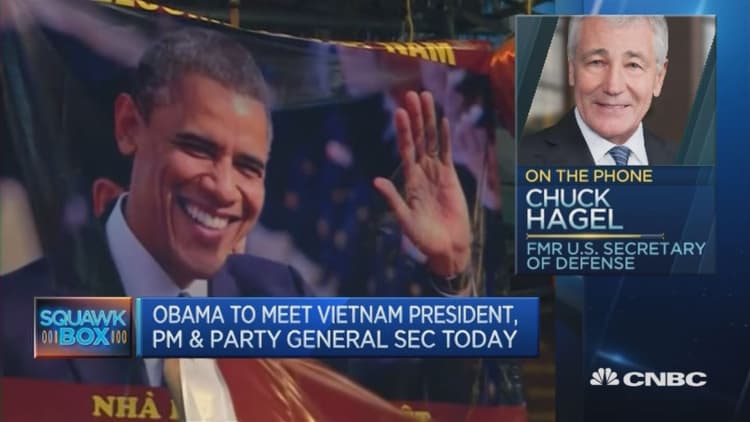


U.S. President Barack Obama begins a landmark visit to Vietnam this week but it's unlikely he can satisfy the two key areas of focus for local policymakers, strategists told CNBC.
Obama landed in Hanoi early on Monday, becoming the third U.S. leader to visit the Socialist Republic since the end of the Vietnam War and marking the 10th Asian trip of his presidency. The visit was "the right thing to do," Chuck Hagel, former U.S. Secretary of Defense during Obama's second administration, told CNBC's "Squawk Box," adding that Washington has made remarkable progress in reconciling with the Vietnamese in recent years.
During Obama's three-day visit, much emphasis is expected to be placed on the Trans-Pacific Partnership Deal (TPP) and an embargo that prevents Washington from selling arms to Hanoi. But not much traction is expected on either front.
As the biggest trade deal in a generation, the TPP is set to usher in a new period of growth for export-oriented Vietnam, whose economy is already expanding at the fastest pace in seven years.
"Vietnam is going to be the best beneficiary of TPP. Textiles and the apparel sector will see the greatest benefits in term of an immediate slash of tariffs in the U.S. and other markets," said Eric Shimp, policy adviser at international law firm Alston & Bird.
But chances of Congress approving the deal this year remain slim amid hostility to new trade liberalization from both Democrats and Republicans.
"Don't plan on ratification this year," Shimp said. "There's talk the White House may move ratification through a lame duck session in November, after elections, but there's really no political willpower to do that in Congress...There's generally an anti-free trade political culture that's emerged in terms of foreign competition and job losses attributed to trade."
The World Bank estimates the agreement could add about 10 percent to Vietnam's GDP by 2030 and a prolonged delay could risk slowing the positive momentum currently buoying the Southeast Asian nation.
"Hopefully with his [Obama's] visit. he can see that the nation is growing, there's a lot of opportunities here, and both countries will benefit from the TPP," noted Andy Ho, managing director and chief investment officer of VinaCapital, one of Vietnam's biggest investment funds.
Over the weekend, the country held its once-every-five-year parliamentary election after installing new Prime Minister Nguyen Xuan Phuc and hopes are high for more reforms that boost growth.
"We are confident that the policies set for the last five years will continue. What we hope is the acceleration of these policies to encourage more foreign investments, to encourage more infrastructure development, to encourage more education and training," stated Ho.
The political transition comes as Vietnam braces itself for challenges abroad, particularly tensions over territorial disputes with China in the South China Sea.
Amid Beijng's aggressive island-building activity in the area, leaders in Hanoi are hoping Obama will end the current arms embargo that prevents Vietnam from modernizing its armed forces.
"I don't think this visit will produce an immediate, full lifting of the prohibition on arms sales," Shimp said, adding that Obama partially lifted the ban a year ago.
"Quite a bit of the U.S. Congress remains cautious about selling arms to Vietnam with a blank check approach. There are concerns over human and labor rights that these constituencies in Congress want linked to defense sales," he explained.
Instead, both parties could ink a compromise agreement that could open other portions of the military defense sectors to case-by-case decisions by Washington regarding sales, Shimp explained.


